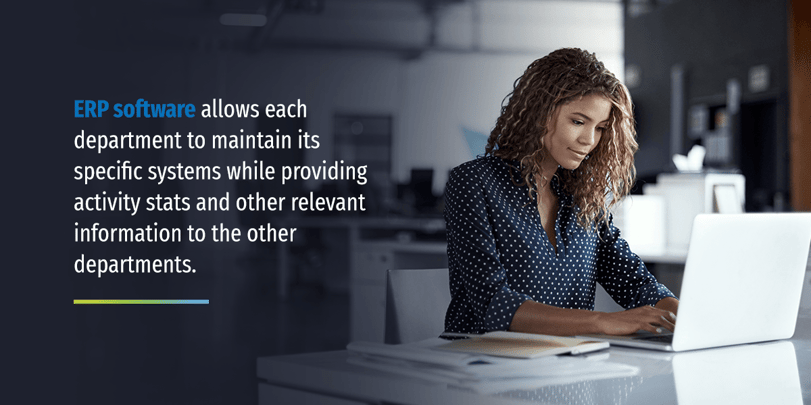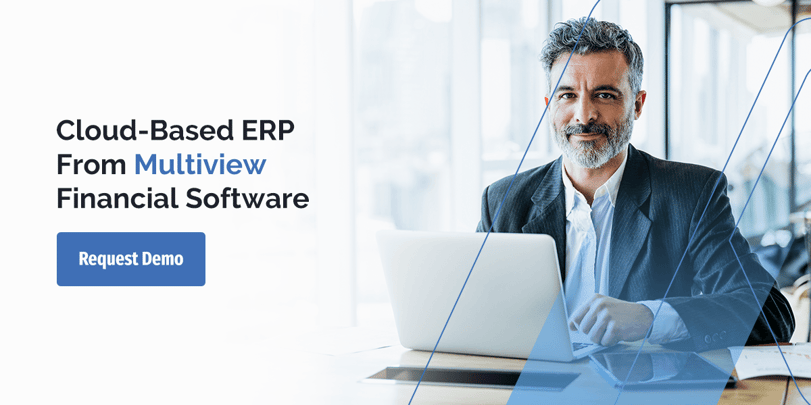Enterprise resource planning (ERP) systems are becoming increasingly popular investments for many businesses. In some cases, ERP is replacing the accounting software that many have relied on for years.
If your organization is experiencing growth or you find yourself wondering whether you need accounting software or ERP, we’ve got you covered. Although these terms are sometimes used interchangeably, several key differences set them apart. First, let’s take a look at what they do on an individual level.
Accounting Software Overview
Accounting software is primarily used to assist accountants and other record-keepers in reporting an organization’s financial transactions. This type of software provides an automated reporting system that saves employees time, reduces accounting costs and saves office space. By eliminating physical binders, accounting software allows professionals to conduct audits and stay organized in a simplified manner.
The types of transactions that can be recorded with this type of software include accounts payable and receivable, and the software often assists with bank management, payroll, sales tracking and more. They are designed to provide enhanced visibility into your business’s profits and losses while providing relevant reports.
As the name suggests, accounting software is a great tool for managing your organization’s accounting aspects. It provides focused insights for this specific division of your company’s operations. However, there are limitations to the level of insights you can get into your business’s ebbs and flows because of this particular focus.ERP Overview

ERP Overview
Enterprise resource planning software, or ERP software, differs from accounting software in that it is a fully integrated solution for businesses. ERP provides all the functionalities of accounting software and allows companies to examine their inventory, customer relationship management and human resources, marketing and other aspects of their business through one application. It can often handle industry-specific functions as well, like barcode scanning.
ERP software allows each department to maintain its specific systems while providing activity stats and other relevant information to the other departments. It connects various facets of your organization, allowing you to understand the effects of each department on one another. This integrated software links the intangible factors of your business, such as product lifecycles, customer satisfaction and working hours, with tangible financial data.
ERP vs. Accounting Software for Businesses
What is the difference between ERP and accounting software? At their core, accounting and ERP systems aim to provide employees with a more streamlined, insightful approach to record-keeping. By exploring the core difference between accounting software and ERP systems, you can more easily identify the answer for which system your organization needs.
Functionality Differences
Perhaps the most apparent difference between the two lies in the scope of work they can perform. Accounting software functions to provide streamlined reporting for financial departments, generate reports to save time and conduct all record-keeping virtually to save space. While ERP also saves time and space, what makes ERP different is the scope of business functions it records and the way it stores this data.
ERP systems present data in a visually overlapping manner. Data is streamlined from various departments so finance departments can make more educated, advanced decisions for their organization.
Benefits of Using an ERP vs. Accounting Software
Due to the differences in scope, ERP systems provide many advantages over accounting systems. One of the most common reasons to invest in ERP is that it provides real-time data. Since ERP systems record many business functions, like customer relationship management, it is constantly updating and providing a full picture of your business operations. By checking just one interface, you can see accurate, live metrics.
When relying on specific accounting software, you have to compare this data to other metrics manually. With ERP, you can have the best of both worlds.
While accounting software can perform all accounting functions, ERP can perform accounting functions and then some. Accounting and financial management is a given sub-function of any ERP system. ERP tracks general ledger and payroll on top of inventory, customer communication and more.
In summary — ERP can help you propel your business forward by connecting the dots and providing an all-in-one view of your operations. Understanding how each department’s actions impact your organization’s income can exponentially amplify your efficiency.
What Your Business Should Consider
While utilizing an ERP system seems like the logical choice in every situation, there are some cases where basic accounting software may make the most sense for your business. The system you choose will maintain some of the most important information of your ongoing operations and can be a hefty investment. Because of this, it’s important to look at the full picture and consider various factors.
Here are some of the top things to think about when deciding whether to invest in an integrated ERP or specialized accounting system:
The Size of Your Company
Often, small businesses decide to start with basic accounting software and eventually move to ERP if the demand presents itself. If you have a smaller organization, sometimes accounting software makes more sense. With a wide range of department data comes the need to manage and record that data. ERP systems require more personnel to ensure the system performs the way it should. On the other hand, accounting software could most likely be managed solely by a small business owner.
Pricing and Your Budget
Given that ERP manages various facets of your business and provides greater flexibility, this streamlined system often comes with a higher cost of ownership. Since accounting software typically costs less, it may be a more logical investment for small businesses or organizations that need to allocate their budget to specific areas.
But even though implementing and maintaining ERP is more expensive, it pays off in countless ways if your company can afford it. The return on investment shows through increased efficiency and visibility.
Cloud-Based Systems
Even though many accounting and ERP systems are hosted virtually, it is important to ensure that the software is flexible and secure. Once you choose which type of system is right for you based on functionality and scope, the decision-making process doesn’t stop there. Deciding whether to invest in cloud-based software is another huge factor to consider.
When given the chance, investing in cloud-based systems is always the smarter move. When your accounting or ERP system is hosted in the cloud, your storage capacity expands right alongside your organization. Perhaps the most reassuring thing about cloud storage is the level of security it provides. Cloud hosting has strong encryption and keeps your data accessible should anything happen to your business’s physical computing system.
Cloud-Based ERP From Multiview Financial Software
Whether your organization operates in finance, education or healthcare, Multiview Cloud ERP can streamline your organization’s operations. We provide a cloud-based, integrated ERP platform to save you time and space while enhancing the transparency of your record-keeping. Create an environment where accounting, HR, inventory management, marketing and other departments provide context to your organization’s financial decisions. With our cloud-based operating system, you’ll experience increased transparency and security.
Multiview is a client-focused ERP vendor driven by a passion for finance and service excellence. With 30+ years of experience, we empower clients with scalable solutions, breaking down data silos and automating accounting processes. Our vision is to eliminate month-end hassle, enabling clients to utilize numbers effectively.
Discover how Multiview transforms financial management with our client-centric ERP solutions, rooted in a deep passion for finance and exceptional service. Learn about our journey over the past 30 years to empower clients by breaking down data silos, automating accounting processes, and providing unparalleled access to information through advanced reporting software.
Watch our video to see how we're making "month-end" a concept of the past and helping you leverage numbers for strategic decision-making.
Request a demo of our ERP system today for your business. To learn more about our financial applications for enterprises of any size, contact us to find the right fit. Our team members can help you implement a system to streamline your operations like never before.

